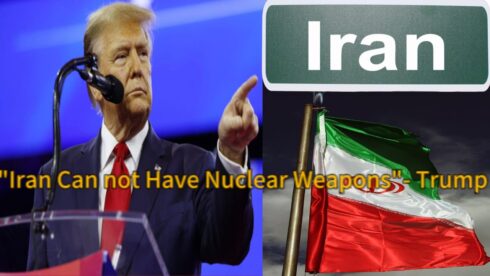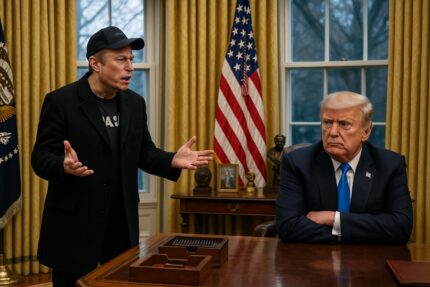Donald Trump has made a powerful and controversial statement, asserting that Iran “cannot have nuclear weapons.” His blunt declaration underscores the continued tension between the U.S. and Iran, as Tehran advances its nuclear program. Trump’s rhetoric heightens concerns over the future of diplomatic negotiations, as critics fear the president’s hardline stance could lead to military escalation, while supporters argue that it is a necessary move to prevent Iran from becoming a nuclear power. The president’s comments resonate globally, signaling that his administration will not back down from its commitment to counter Iran’s growing nuclear capabilities.
Donald Trump’s statement is a clear indication of his administration’s strategy in handling Iran, reaffirming his rejection of the 2015 Iran nuclear deal and its limitations. As Tehran accelerates its uranium enrichment, Trump’s forceful rhetoric serves to remind the world that the U.S. will not allow Iran to cross the nuclear threshold. The broader impact of this declaration, however, remains contentious, with some fearing it might provoke further instability in the Middle East and others seeing it as a strategic move to maintain U.S. dominance in the region.
The Growing Threat of Iran’s Nuclear Program
Donald Trump has long expressed his concerns over Iran’s nuclear ambitions, citing the potential threat it poses to regional and global security. Since pulling the U.S. out of the 2015 Joint Comprehensive Plan of Action (JCPOA), Trump’s administration has been increasingly vocal about Iran’s non-compliance with the terms of the agreement. Despite Tehran’s assurances that its nuclear program is peaceful, the U.S. president insists that its activities, including the recent enrichment of uranium, suggest otherwise. Trump argues that allowing Iran to acquire nuclear weapons would destabilize the Middle East, empower terrorist organizations, and threaten the security of U.S. allies like Israel.
Donald Trump’s approach to this growing threat has involved imposing severe economic sanctions, targeting Iran’s economy and oil exports to cripple its nuclear ambitions. While these measures have strained Iran’s economy, they have not yielded the desired results, with Tehran continuing its nuclear advancements. The situation has grown increasingly tense, as Trump’s unwavering stance could force a confrontation or lead to a diplomatic stalemate. Critics argue that pulling out of the nuclear deal and ramping up pressure has only hardened Iran’s resolve, making a peaceful resolution less likely.
Trump’s “Maximum Pressure” Campaign: Diplomatic Standoff or Tactical Strategy?
Donald Trump has implemented what he refers to as a “maximum pressure” campaign against Iran, leveraging crippling sanctions to force Tehran back to the negotiating table. However, Trump’s critics argue that this strategy has failed to yield any tangible results, with Iran refusing to comply with U.S. demands. Despite the lack of immediate success, Trump maintains that the economic sanctions are putting immense pressure on Iran, forcing the regime to reconsider its nuclear ambitions. The administration’s goal, according to Trump, is clear: Iran must abandon its pursuit of nuclear weapons for any meaningful diplomatic dialogue to take place.
While the pressure has undoubtedly weakened Iran’s economy, many experts believe that Donald Trump’s tactics have alienated international allies, particularly European nations who remain committed to the JCPOA. Trump’s aggressive stance has been perceived by some as a diplomatic failure, potentially isolating the U.S. from critical global partnerships. However, Trump’s supporters argue that the maximum pressure campaign is an essential tool in preventing nuclear proliferation and defending U.S. interests in the region. Whether this approach will ultimately succeed in curbing Iran’s nuclear program remains uncertain.
The Geopolitical Consequences of Donald Trump’s “No Nuclear Weapons” Stance
Donald Donald Trump’s statement that Iran cannot have nuclear weapons carries significant geopolitical consequences that extend beyond U.S.-Iran relations. Iran’s pursuit of nuclear weapons has been a source of tension in the Middle East, with regional powers such as Israel and Saudi Arabia viewing Iran’s nuclear capabilities as an existential threat. Trump’s firm stance on the matter is seen as an effort to prevent a shift in the balance of power in the region, which could lead to an arms race. If Iran were to acquire nuclear weapons, other nations in the Middle East may feel compelled to follow suit, further destabilizing an already volatile region.
The broader international community is also on edge, as Donald Trump’s rhetoric could spark a wider conflict in the Middle East. Countries like Russia and China, which have supported Iran in various diplomatic arenas, view Trump’s policy as a destabilizing force. This clash of interests raises the stakes for the region, where tensions between the U.S. and its adversaries could escalate into a full-blown conflict. For Trump, this stance is about asserting U.S. dominance and securing regional allies, but it also places significant pressure on other nations to align with or against his policies.
The Risk of Military Escalation: A Precursor to Conflict?
Donald Trump’s declaration that Iran cannot possess nuclear weapons has reignited concerns about the possibility of military escalation. Although Trump has insisted that he seeks peace, the rhetoric suggests a readiness to take military action if necessary. Israel, a staunch U.S. ally in the region, has been particularly vocal in its belief that military intervention may be required to stop Iran from acquiring nuclear weapons. As tensions rise, Trump’s administration has not ruled out military strikes against Iranian nuclear facilities, which could provoke severe retaliation from Tehran.
The potential for conflict is heightened by the fact that Iran has strong alliances with various proxy groups across the region, including in Iraq, Syria, and Lebanon. These groups could serve as conduits for Iranian retaliation, drawing U.S. forces into a broader regional conflict. Additionally, any military confrontation with Iran would likely disrupt global oil markets, sending shockwaves through the global economy. While Trump’s statements serve as a warning to Iran, the possibility of military conflict remains a critical concern for both the U.S. and its allies.
Trump’s Legacy on Iran: A Dangerous Gamble or Diplomatic Opportunity?
Donald Trump’s hardline approach to Iran’s nuclear program will be a defining aspect of his foreign policy legacy. His critics argue that his aggressive tactics, including withdrawing from the JCPOA and imposing heavy sanctions, have escalated tensions to dangerous levels, with the risk of military conflict looming large. However, Trump’s supporters contend that his tough stance is the only way to prevent Iran from becoming a nuclear power and to secure long-term stability in the Middle East. Whether his approach is ultimately seen as a success or failure will depend on the outcome of ongoing negotiations and the effectiveness of his “maximum pressure” campaign.
As Trump prepares for future diplomatic challenges, the U.S. administration’s policies toward Iran will continue to shape its relationship with other global powers. While Trump remains committed to ensuring Iran does not acquire nuclear weapons, the question remains whether his methods will lead to a peaceful resolution or further escalation. The world watches closely as the U.S. navigates the delicate balance between diplomacy, military threats, and economic sanctions in its efforts to prevent Iran from becoming a nuclear power.














